
At a small performing arts festival I went to recently I was excited to see that they had dedicated all of an afternoon to an “Open Space” format.
It’s a kind of “unconference” with a brilliantly simple structure that enables the attendees to create the agenda on-the-fly and explore whatever they like. These are near and dear to me, as I spent thirteen years facilitating open spaces all over North America and Europe.
Now there was one that I could participate in as an attendee, which gave me the chance to bring up my most pressing subject. I wrote it on a card and brought it up to the big agenda board:
I’m a late-diagnosed ADHD creative. What do I need to know?
When I’d gotten the official diagnosis about eight months ago it had shifted my perspective and understanding of all my other roles and identities: student, son, father, grandfather, teacher, Marine, EMT, artist, writer, presenter, performer.
(If you ever want to find the late-diagnosed ADHDers, just listen for their call: Oh…that makes so much more sense now!)
I’d hoped for an open space to share our experiences.
These were my people; performers, artists, community leaders who I’d known of (and in some cases worked with) for decades. I thought if anyone will understand what I’ve been dealing with, they will.
There was proof of this as I put my proposed session up on the board: another session on ADHD and autism was already there, and the host was a licensed therapist! They* said that they had ADHD themselves, and were in the process of creating a class to help others in our community who had both ADHD and autism (which are closely related).
I spoke briefly with them and we decided to combine our sessions. They were there to teach, I was there to listen and learn. Several other attendees were excited when they saw the session added to the agenda. “I’m so glad someone wants to talk about that!”
That’s the magic of open-space events. The dozen or so people who came to the session were peers, not patients. We shared a similar diagnosis in the DSM-5, but our experiences varied widely.
I don’t have any basis to judge this therapist in their everyday practice. They seemed friendly, competent, and knowledgeable.
The problem I had was that they treated us as if we were patients, who had been seeking treatment. Most of us had been living with this for years or (in my case) had channeled the ADHD “superpower” of hyperfocus to do a deep-dive into the whole condition.
We had read books, listened to podcasts, and watched videos (so many videos) about coping skills, medications, current and past research, dopamine, and whether or not it should be called “ADHD” at all.
We had not only learned what scientists think is going on under the hood in our racing brains, we’d shared and viewed thousands of hours of experiences on Instagram, TikTok, YouTube, and Medium.
Who has a better grasp of living with late-diagnosed ADHD:
A 54-year old diagnosed a year ago.
A 39-year old diagnosed a decade ago.
A 25-year old diagnosed last week.
If you answered 1, 2, or 3, gotcha! It’s a trick question, because the answer is all (or none) of the above. All of them have some grasp of what it’s like to live with their particular situations — and by sharing them, we can find the overlapping parts and maybe help each other out.
My hope was that in that performer-rich environment of this Open Space I’d have other people who had been dealing with their late-diagnosis longer than me that could share how they’d managed to navigate the paradigm-shift that it entails.
That depends on two things, though: one, that they’ve actually spent time thinking about their experiences (as opposed to just surviving them) and two, that they are given the opportunity to speak and share that knowledge.
That is where the host fell short.
An Open Space session is not group therapy.
The host went into a fairly obvious therapist mode at the beginning. If you’ve been in therapy, you would recognize the cadences of non-confrontational tone, of setting up a “safe space” for our fidgets and other coping mechanisms. They also gave a summary of the particular theory of what ADHD is (there are many) that they subscribed to.
The problem was that it wasn’t presented as here’s what I understand, here’s what I find comfortable and logical. Instead it was this is the way it’s going to be. This is the way it is.
Then they opened the floor to questions we might have about ADHD, especially as it applied to the performing arts.
One person immediately raised her hand: What are some tips for directors who have ADHD?
My own brain immediately went to the issue of time-blindness; as a director/creator in some performances, I have spent way too much time on individual parts of a performance without realizing it, and deadlines? Ha! Deadlines are just pretty little marks on the calendar that make nifty whizzing noises as they fly by.
But before I — or anyone else — could even raise a hand, the host of the session was answering the question — using terms directly from psychological treatment.
I get it — you use the tools you know, and I also believe very much in the beneficial outcomes that can come from therapy.
But we weren’t there for therapy. We were there to share our brains and maybe find something new to take back with us to the world. And for me, at least, the phrases the host used took me out of the sharing space and into an authoritative healer-patient space — where we were no longer peers, but instead were people with problems coming to the fount of psychology for relief.
It got worse when I was able to finally share my experience.
I talked about my frustration with the difficulties I’d always had with strict schedules, especially around creative activities. I mentioned the many people I’d created and performed with who’d been frustrated by my reluctance to put time bounds on either practice or performance.
The host listened, along with the rest of the people in the group, and the nods I saw seemed sympathetic.
And then they said, “Now…how can you reframe that time-blindness into a positive thing, a skill you have that helps, rather than holds you back?”
I felt a tremendous rush of emotion at the words. I’m sure some of it showed on my face, but I didn’t immediately react. Why am I suddenly feeling hurt and angry?
I realized it was because I’d shared some personal pain, years of frustration, thinking I was in a space where that could be recognized — shared pain is lessened, as they say — but instead I ran smack into a wall of positive psychology.
Again, I get it. Reframes are incredibly useful in certain situations, especially in therapy. Hell, the entire experience of being diagnosed with ADHD had caused a seismic reframe of my entire life.
But there are times when you want help solving things — and there are times when you simply want to be heard, supported, or perhaps even understood.
This was one of those times, and the flexing of their therapy muscles had taken that away.
I contributed to my own discomfort.
Before this turns completely into a hit piece (too late!) let me acknowledge a few things:
The host of the session had already stated that this was the trial-run of a class they were hoping to offer at other conventions. Everybody there was a beta-tester, and we’d been told that before we started.
I hadn’t participated in the setting of norms at the beginning of the session — a technique I am very aware of. Specifically, I hadn’t said “I’m hoping to listen and be listened to, not fixed.”
There is one law of Open Space events, known as the “Law of Mobility”. It states, simply: if you are no longer benefiting from or contributing to a session, go somewhere that you can. I know this better than anyone else there, having thirteen years of hundreds if not thousands of sessions in my past — and yet I let myself sit there and be unhappy.
I give immense credit to the person who hosted the session. They put themselves out there with a sincere desire to help others who were neurodivergent.
But the experience also served as a cautionary tale of letting our preconceived skills and comfort zones get in the way of being open and vulnerable to other viewpoints.
At least, that’s what I got out of it.
I plan to go to more open spaces and talk with other neurodivergent people. I’m even playing around with the idea of hosting an open space event specifically for people to talk about ADHD.
Whatever comes of it, though, I hope that we all can hear experiences without the need to fix them. Acknowledge the difficulty without the need to change it.
And maybe we’ll come out of it with a little better understanding of ourselves and a little less feeling alone.

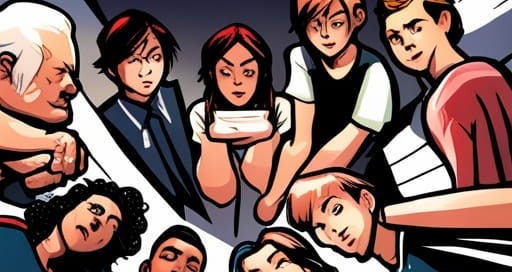



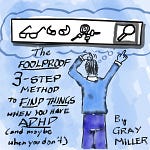




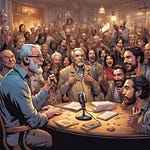
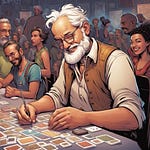
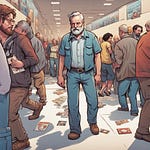
Share this post